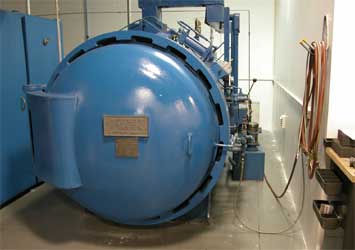Autoclave Testing Studies
Abrasion Testing
Accelerated Life Testing
Chemistry Laboratory
Computer Modeling
Salt Spray Testing
Density
Electrical Properties
Electron Microscopy
Experimental Foundry
Failure Analysis
Hardness Laboratory
Heat Treatment Studies
Light Microscopy
Lubrication Testing
Machine Shop
Materials Databases
Mechanical Testing
Metallography
Paint & Coatings
Product Testing
Rolling Mill
Thermal Testing
HEAT TREATMENT STUDIES
The following list provides an overview of Touchstone’s capabilities in heat treatment:
- Autoclave
- Continuous Annealing Furnace
- Controlled Atmosphere Furnaces
- Cryogenic Thermal Treatment
- Differential Scanning Calorimeter
- Foundry (Ingot / Re-Melt Furnace)
- Hot Microhardness Tester
- Mechanical Testing at Elevated and Cryogenic Temperatures
- Ovens
- Quartz Lamp Furnaces
- Resistance Furnaces
- SEM with Hot Stage
- Tube Furnaces
- Vacuum Evaporator
Autoclave Testing Studies

Touchstone has several heated pressure vessels of various capacities and temperature/pressure capabilities available for atmospheric/vacuum heat treatment, controlled-atmosphere brazing, infiltration/impregnation (e.g. polymer matrix composites), polymer curing, coal or petroleum coking, sterilization, component pressure testing, or chemical reaction research. Their specifications are as follows:
- One 30-inch diameter, 30-inch length autoclave
- 600C and 500 psi (or vacuum) operating capability
- Programmable multi-step temperature and pressure control
- Multi-atmosphere capability (oxidizing, inert, reducing)
- Two 1.5 gallon high-pressure reactors
- 600C and 3000 psi operating capability
- Programmable multi-step temperature and pressure control
- Stainless steel vessels
- Can also be operated as stirred reaction vessels
- Manufactured by Parr Instruments
- Two 4-inch diameter, 12-inch length laboratory reactors
- 600C and 500 psi (or vacuum) operating capability
- >800C service at lower pressures
- Internal ceramic fibrous insulation and heaters
- Programmable multi-step temperature control
- Stainless steel vessels
- Manufactured by Touchstone
- One laboratory steam autoclave
- 120C and 60 psi operating capability
- Steam heated
- Stainless steel vessel
- Manufactured by Castle Sterilizer
- Various other laboratory-scale heated pressure vessels available that can be customized to meet specific research requirements
Most of these were originally designed or purchased to support Touchstone’s development of carbon foam (CFOAM™) from coal-based feedstocks. Each can be outfitted with an array of auxiliary temperature and pressure sensors to monitor process conditions or material response. A mobile computer with an 8-channel I/O card and LabView” software is configured to accept multiple process data inputs, such as that from temperature and pressure transducers, to provide a detailed log of experimental conditions. The systems can also be interfaced with gas sampling ports for gas chromatography/mass spectrometry identification of volatilized species.

